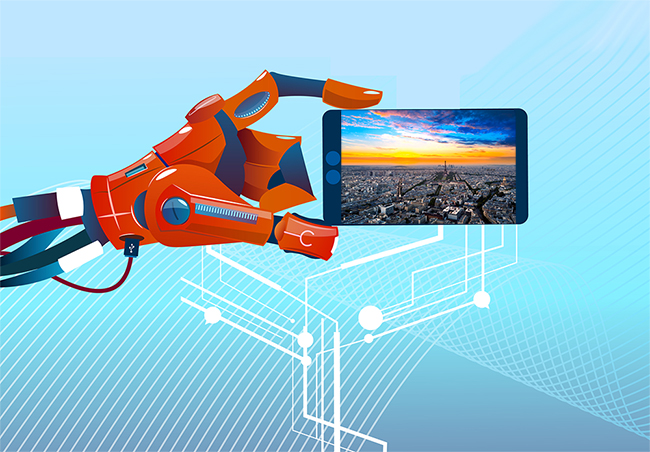In the rapidly evolving world of photography, artificial intelligence (AI) is making significant strides, revolutionizing how photographers capture and edit images. AI is enhancing image quality, providing innovative tools for creativity, and simplifying complex editing processes. Whether you are a professional photographer or a hobbyist, understanding how AI is reshaping this field can help you leverage these advancements to elevate your work.
Enhancing Image Quality

One of the most prominent ways AI is transforming photography is through enhancing image quality. Modern cameras equipped with AI technology can analyze and process images in real-time, making adjustments to improve clarity, color balance, and exposure. This results in higher-quality photos with less effort from the photographer.
For instance, AI algorithms in cameras like the Sony A7R IV or the Canon EOS R5 can automatically detect scenes and subjects, adjusting settings to optimize image quality. These cameras use machine learning to recognize various elements such as faces, landscapes, and low-light environments, ensuring each shot is captured perfectly.
Moreover, AI-powered noise reduction techniques significantly improve the quality of images taken in low-light conditions. Traditional noise reduction methods often compromise detail, but AI algorithms can distinguish between noise and actual image details, maintaining clarity and sharpness.
Advanced Autofocusing
AI is also making waves with advanced autofocusing capabilities. Traditional autofocus systems rely on predefined settings, but AI-driven systems can adapt in real-time to the subject’s movements and the scene's complexity. This is particularly beneficial for sports and wildlife photographers who need to capture fast-moving subjects with precision.
Cameras like the Nikon Z9 and the Sony Alpha 1 feature AI-driven autofocus systems that track subjects' eyes and bodies with remarkable accuracy. These systems use deep learning to predict movements, ensuring the subject remains in focus even in dynamic scenes. This technology significantly reduces the number of out-of-focus shots and enhances the overall success rate of capturing sharp images.
Simplifying Editing Processes
Beyond capturing images, AI is revolutionizing post-processing and editing. Traditional photo editing can be time-consuming and requires a high level of skill, but AI-powered software simplifies these processes, making professional-quality editing accessible to everyone.
Adobe Lightroom and Photoshop, for example, have integrated AI features that streamline complex tasks. The AI-powered Auto Tone feature in Lightroom analyzes the photo and applies optimal settings for exposure, contrast, and color balance with a single click. Similarly, Photoshop’s AI-driven tools like the Content-Aware Fill and Sky Replacement allow users to make sophisticated edits quickly and effortlessly.
Another notable AI-powered editing tool is Luminar AI, which offers features like AI Sky Enhancer and AI Skin Enhancer. These tools automatically detect and enhance specific elements in an image, saving photographers significant time while achieving stunning results.
Creative Tools and Innovations
AI is not only enhancing existing processes but also introducing new creative tools that expand the possibilities for photographers. AI-driven applications like DeepArt and Prisma use neural networks to transform photos into artwork inspired by famous artists' styles. These tools provide photographers with unique ways to express their creativity and produce visually striking images.
Moreover, AI-powered apps such as PhotoRoom and Remove.bg allow photographers to effortlessly remove backgrounds and create clean, professional images suitable for e-commerce, marketing, and social media. These tools use AI algorithms to accurately detect and separate subjects from the background, providing a seamless editing experience.
The Future of AI in Photography
As AI technology continues to evolve, its impact on photography will only grow. Future advancements may include even more sophisticated image recognition and editing capabilities, as well as new creative tools that push the boundaries of what is possible.
One exciting area of development is AI's potential in generating high-resolution images from low-quality inputs, known as super-resolution imaging. This technology could enable photographers to enhance old or low-quality photos to a standard previously unattainable.
Additionally, AI-driven cameras and software are likely to become more intuitive, learning from the user’s preferences and styles to provide personalized suggestions and edits. This will further streamline the workflow, allowing photographers to focus more on their creative vision rather than technical adjustments.
Embracing AI in Your Photography Journey
For photographers looking to stay ahead in the ever-changing landscape, embracing AI tools and technologies is crucial. Whether you are aiming to improve image quality, streamline your editing process, or explore new creative avenues, AI offers numerous opportunities to enhance your work.
Start by exploring AI features in your current camera or investing in a new model with advanced AI capabilities. Experiment with AI-powered editing software and apps to discover how they can simplify your workflow and inspire your creativity. By staying informed and adaptable, you can harness the power of AI to elevate your photography to new heights.
In conclusion, AI is revolutionizing photography by enhancing image quality, providing advanced autofocusing, simplifying editing processes, and offering innovative creative tools. As the technology continues to evolve, it promises to unlock even more possibilities for photographers, transforming how we capture and edit our world.
For further reading on the impact of AI in photography, you can check out [this article by Digital Camera World and this insightful piece from PetaPixel.